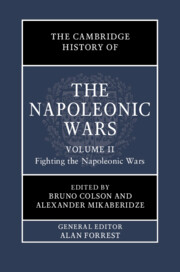Book contents
- The Cambridge History of the Napoleonic Wars
- The Cambridge History of the Napoleonic Wars
- The Cambridge History of the Napoleonic Wars
- Copyright page
- Contents
- Figures
- Maps
- Key to maps
- Tables
- Contributors to Volume II
- Introduction to Volume II
- Part I The Nature of Warfare in the Napoleonic Era
- Part II The State of the Armed Forces
- 5 Napoleon’s Grande Armée
- 6 The Austrian Army
- 7 The Prussian Army
- 8 The Russian Army
- 9 The British Army
- 10 The Royal Navy
- 11 The French Navy
- Part III Raising and Supplying the Armies
- Part IV Napoleon’s Military Campaigns in Europe
- Part V Other Spheres of War
- Bibliographical Essays
- Index
8 - The Russian Army
from Part II - The State of the Armed Forces
Published online by Cambridge University Press: 20 December 2022
- The Cambridge History of the Napoleonic Wars
- The Cambridge History of the Napoleonic Wars
- The Cambridge History of the Napoleonic Wars
- Copyright page
- Contents
- Figures
- Maps
- Key to maps
- Tables
- Contributors to Volume II
- Introduction to Volume II
- Part I The Nature of Warfare in the Napoleonic Era
- Part II The State of the Armed Forces
- 5 Napoleon’s Grande Armée
- 6 The Austrian Army
- 7 The Prussian Army
- 8 The Russian Army
- 9 The British Army
- 10 The Royal Navy
- 11 The French Navy
- Part III Raising and Supplying the Armies
- Part IV Napoleon’s Military Campaigns in Europe
- Part V Other Spheres of War
- Bibliographical Essays
- Index
Summary
Imperial Russia combined elements of the European early modern military‒fiscal state with features familiar to historians of Eurasian empires. The core of Russian international power was a professional, regular army organised and trained on European lines, sustained by effective administrative and fiscal institutions, and rooted in the tight alliance between a strong monarchy and a hereditary landowning and service nobility which took Europe as its model. To these sources of power Russia’s Eurasian imperial heritage added strategic depth and enormous natural resources. Russia’s Cossack irregular cavalry, heirs to an old tradition of Eurasian steppe warfare, played a major role in Napoleon’s defeat in 1812‒14. Even more important was the fact that the Russian Empire stood first in the world as regards horsepower in an era when the horse was vital to success in war. Together with these structural elements of Russian power the ability of the Russian army to learn and apply the lessons of Revolutionary and Napoleonic era warfare made a crucial contribution to its triumph in 1812‒14.
Keywords
- Type
- Chapter
- Information
- The Cambridge History of the Napoleonic Wars , pp. 150 - 169Publisher: Cambridge University PressPrint publication year: 2023

